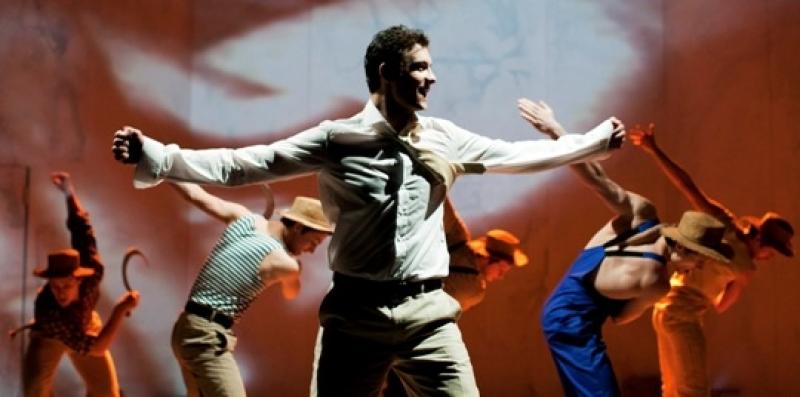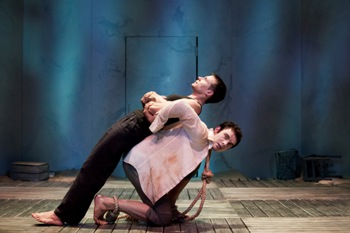The Tempest, Cheek By Jowl, Barbican Theatre | reviews, news & interviews
The Tempest, Cheek By Jowl, Barbican Theatre
The Tempest, Cheek By Jowl, Barbican Theatre
Thrills and spills in a tough new Russian version

Tradition, in the form of Victorian performance, conferred on The Tempest the VC of Highest Shakespearean Poetry, though it probably wasn't Shakespeare's final play. John Gielgud was in an important sense the last great Victorian English thesp and, in the apparently valedictory role of Prospero, took the island parable to an Olympus of rhetoric.
This is the company's fourth production in Russian, in a scheme hatched in 1999 by Moscow's Chekhov International Theatre Festival to get director Declan Donnellan and designer Nick Ormerod working with Russian actors - an earlier Shakespeare of theirs was Twelfth Night. I'm not a Russian speaker, so can't tell how much Shakespeare is truly represented in this translation (no translator is credited), but there's a lot of bellowing. There are huge cuts. Igor Yasulovich as Prospero is just so consistently cross with Miranda (Anya Khalilulina, pictured below) that a yearning for Gielgudian tenderness begins to tug not half an hour into this speeded-up, two-hour toughie of a Tempest.
 In a way, it's a bit of an irrelevance to assess the delivery, as the actors, who are clearly good, all bellow and do so in a language most in the Barbican's elegantly proportioned Silk Street Theatre audience surely don't know. The surtitles indicate about a 40 per cent cut to Shakespeare, mainly of Prospero's lines. The set is minimal: a large, three-panelled screen each with a door, put to wonderful use in the storm scene at the start. Through the doors, fragments of the mariners crowd and struggle and shout (in merciful contrast to one Tempest I saw in which an entire prow of a life-size ship trundled towards front of stage like a piece of museum replica losing control: this was at a famous theatre), while Prospero sits on a beer crate pleased with his mayhem.
In a way, it's a bit of an irrelevance to assess the delivery, as the actors, who are clearly good, all bellow and do so in a language most in the Barbican's elegantly proportioned Silk Street Theatre audience surely don't know. The surtitles indicate about a 40 per cent cut to Shakespeare, mainly of Prospero's lines. The set is minimal: a large, three-panelled screen each with a door, put to wonderful use in the storm scene at the start. Through the doors, fragments of the mariners crowd and struggle and shout (in merciful contrast to one Tempest I saw in which an entire prow of a life-size ship trundled towards front of stage like a piece of museum replica losing control: this was at a famous theatre), while Prospero sits on a beer crate pleased with his mayhem.
There are many, many bright points - cultivated gestures - in the production. One of the doors opening to show Ferdinand (Yan Ilves) hanging upside down, arms clawing towards the floor and so suggesting a man swimming for his life, is worthy of Robert Lepage. The panels are used throughout for stylish sky and sea video. And those doors again: they open to eject five dark-suited men with their backs to us, all Ariel, which is a lovely idea - four go on to comprise a band (accordion, clarinet, tom-tom, mini-vibes) evocatively rolling out Prospero's magic when required, while Ariel is swiftly, cleanly played by Andrey Kuzichev. Instead of wood, it's Ariel whom Ferdinand carries on his back (pictured below), an ingenious solution to the nightmare of logs clattering everywhere.
 Water, buckets of it, everywhere: sluicing down a horny Ferdinand, bathing a tomboy Miranda, dousing the hapless usurpers (Antonio et al), torturing (and it's very funny) a lost, twinky Trinculo (Ilya Illin). Caliban - Alexander Feklistov - roars conventionally enough and, daubing himself and Stephano (Sergey Koleshnya) with warrior gunk to take on Prospero, hasn't actually been given enough thought to make him distinct from every other Caliban you've ever seen. Anya Khalilulina is brilliant as Miranda, crouching and stalking across the stage like a wildcat on heat. The masque (Act IV, scene 1) turns into a parodic, Soviet-style song-and-dance routine with men in straw hats carrying sickles, which Prospero of course has to stop (Caliban's on his way: "Our revels now are ended..."). House lights up, engineer wanders on - we think something's gone wrong: very clever.
Water, buckets of it, everywhere: sluicing down a horny Ferdinand, bathing a tomboy Miranda, dousing the hapless usurpers (Antonio et al), torturing (and it's very funny) a lost, twinky Trinculo (Ilya Illin). Caliban - Alexander Feklistov - roars conventionally enough and, daubing himself and Stephano (Sergey Koleshnya) with warrior gunk to take on Prospero, hasn't actually been given enough thought to make him distinct from every other Caliban you've ever seen. Anya Khalilulina is brilliant as Miranda, crouching and stalking across the stage like a wildcat on heat. The masque (Act IV, scene 1) turns into a parodic, Soviet-style song-and-dance routine with men in straw hats carrying sickles, which Prospero of course has to stop (Caliban's on his way: "Our revels now are ended..."). House lights up, engineer wanders on - we think something's gone wrong: very clever.
There's also some tomfoolery at the end with Trinculo and Stephano mobile-phoning each other (not in Shakespeare, as it happens) and then Miranda, united with Ferdinand, suddenly throwing herself at Caliban in a rage at being sundered from him (for which passion there's not a trace of evidence in the play). There is cleverness and ingenuity aplenty in this fiercely unglamorous Tempest, but no attempt at metaphysics or extended metaphor, which is where its creator had arrived when he wrote it. More probing and less showing off, and perhaps just a little more of the original, would have made this one exemplary.
- Visit Cheek by Jowl's website
Watch Cheek by Jowl's trailer for The Tempest
The future of Arts Journalism
You can stop theartsdesk.com closing!
We urgently need financing to survive. Our fundraising drive has thus far raised £33,000 but we need to reach £100,000 or we will be forced to close. Please contribute here: https://gofund.me/c3f6033d
And if you can forward this information to anyone who might assist, we’d be grateful.

Subscribe to theartsdesk.com
Thank you for continuing to read our work on theartsdesk.com. For unlimited access to every article in its entirety, including our archive of more than 15,000 pieces, we're asking for £5 per month or £40 per year. We feel it's a very good deal, and hope you do too.
To take a subscription now simply click here.
And if you're looking for that extra gift for a friend or family member, why not treat them to a theartsdesk.com gift subscription?
more Theatre
 Midnight Cowboy, Southwark Playhouse - new musical cannot escape the movie's long shadow
Two misfits misfire in misconceived show
Midnight Cowboy, Southwark Playhouse - new musical cannot escape the movie's long shadow
Two misfits misfire in misconceived show
 Thanks for Having Me, Riverside Studios review - snappily performed comedy with a lightweight core
Writer-actor Keelan Kember floods the stage with a torrent of gags but few ideas
Thanks for Having Me, Riverside Studios review - snappily performed comedy with a lightweight core
Writer-actor Keelan Kember floods the stage with a torrent of gags but few ideas
 Rhinoceros, Almeida Theatre review - joyously absurd and absurdly joyful
Ionesco classic gets an entertainingly vivid and contemporary update
Rhinoceros, Almeida Theatre review - joyously absurd and absurdly joyful
Ionesco classic gets an entertainingly vivid and contemporary update
 The Importance of Being Oscar, Jermyn Street Theatre review - Wilde, still burning bright
Alastair Whatley honours his subject in a quietly powerful performance
The Importance of Being Oscar, Jermyn Street Theatre review - Wilde, still burning bright
Alastair Whatley honours his subject in a quietly powerful performance
 Stiletto, Charing Cross Theatre review - new musical excess
Quirky, operatic show won't please everyone, but will delight many
Stiletto, Charing Cross Theatre review - new musical excess
Quirky, operatic show won't please everyone, but will delight many
 Alfred Hitchcock Presents: The Musical, Theatre Royal Bath review - not a screaming success
1950s America feels a lot like 2020s America in this portmanteau show
Alfred Hitchcock Presents: The Musical, Theatre Royal Bath review - not a screaming success
1950s America feels a lot like 2020s America in this portmanteau show
 Wilko: Love and Death and Rock'n'Roll, Southwark Playhouse review - charismatic reincarnation of a rock legend
Johnson Willis captures the anarchic energy and wit of the late guitarist
Wilko: Love and Death and Rock'n'Roll, Southwark Playhouse review - charismatic reincarnation of a rock legend
Johnson Willis captures the anarchic energy and wit of the late guitarist
 Dear England, National Theatre review - extra time for stirring soccer classic
James Graham adds a neat coda to his ode to decency in sport
Dear England, National Theatre review - extra time for stirring soccer classic
James Graham adds a neat coda to his ode to decency in sport
 Weather Girl, Soho Theatre review - the apocalypse as surreal black comedy
A Californian weather girl copes with fires inside and outside her head
Weather Girl, Soho Theatre review - the apocalypse as surreal black comedy
A Californian weather girl copes with fires inside and outside her head
 Clueless: The Musical, Trafalgar Studios review - a perfectly manicured update
KT Tunstall's new score brings bite and momentum to a high octane evening
Clueless: The Musical, Trafalgar Studios review - a perfectly manicured update
KT Tunstall's new score brings bite and momentum to a high octane evening

Add comment